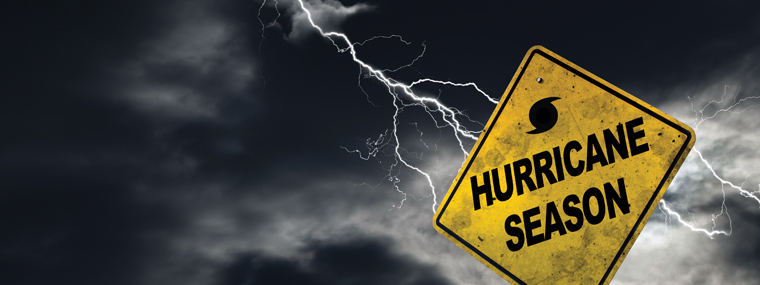
Death, Taxes, and Hurricanes
By Jay Roberts / Published July 2018

But in this world nothing can be said to be certain, except death and taxes. —Benjamin Franklin (1789)
In Florida, condominium owners know there is a third certainty—hurricanes. This article will not help you with death and taxes; as to those certainties, you should contact your doctor and CPA. Rather, hopefully the following will serve as a general guide of tips to implement prior to a hurricane making landfall and what steps to take immediately following a hurricane in order to efficiently manage restoration projects.
Document Everything!—Whether you are a director on the board or a unit owner concerned with how to deal with the insurance company regarding damage to your unit, pre-storm documentation could be key to your claim. I recommend taking digital pictures (with time/date stamp) and filming the current state of the common elements or unit (and contents), as applicable, at least once per year prior to each hurricane season. Clearly showing the insurance company the condition of your property pre-storm can help shorten negotiation/litigation with the insurer as to what should be paid on the policy following the storm damage. Be sure to not store the pictures/videos only at the condominium property, as they are useless if lost to the storm damage.
Emergency Supplies—Verify emergency generators are in wor-king order and have adequate fuel supplies. Stock emergency supplies (flashlights, batteries, water, etc.) in storerooms for use by residents and employees in the aftermath of a storm.
Insurance Policies and Agent Details—Ensure all insurance policies are current and coverage is adequate and compliant with State law; full contact details for insurance companies and agents should be readily available in the event of a storm.
Backup Computer Files—Confirm that computer files crucial to running the building and association are backed up to CDs, portable storage devices, and/or digital cloud storage so that the information can be accessed from a remote location by board members and key association employees.
Create a Committee—Having a committee of owners designated with the task of compiling and distributing the information discussed here is a good way to focus on projects being completed in a timely manner and to keep lists current.
Emergency Lists—Have current hard-copy and digital-copy reference lists complete with the names of all property owners, emergency contact numbers, and details of second residence addresses, as well as a list of all association employees, with full contact details. Make sure all members of the board of directors and all key association employees have copies of these lists. Furthermore, it is a good idea to have a list of contact information for all local emergency response departments. If the association has a website, place the contact information for board members, association employees, and the local emergency response departments on the website.
Vendor Lists—The vendors you trust before a storm should be the first vendors contacted post-storm. This usually includes a water damage restoration company, HVAC servicer, electrician, plumber, general contractor, and fire prevention company.
Bank Account Details and Signatories—Keep handy a list of all bank account numbers, branch locations, and authorized association signatories. Make contingency plans for back-up signatories in case evacuation or relocation becomes necessary.
Evacuation Routes—Establish clear building or community evacuation routes and be sure that all community members are provided with copies or printouts. These routes should be clearly marked as storms approach.
Pre-Storm Summary—Be proactive in aggregating the information discussed above and flexible in storing the information in multiple formats (hard-copies and digital). Lastly, make sure the information is distributed to multiple people.
The best laid schemes of mice and men oft go awry… – Robert Burns (1785)
No matter how well you plan, hurricanes can, and often do, cause damage to the condominium property. Do not make the mistake of complicating the post-storm reconstruction efforts by trading expediency for “doing the right thing” following a storm. The following is a list of practical post-storm considerations for dealing with damage to the condominium property. Within hours of any disaster, affected communities will be besieged with offers by companies and individuals offering disaster recovery assistance. Resist contracting with these initial offers until you have taken care of the following items:
- Once residents are safe, the community should begin surveying the property and assessing the damage. A designated information facilitator should set up a system of information sharing among local homeowners, and a disaster coordinator should serve as liaison to emergency services providers. Document the damage caused (pictures and video, if possible).
- Secure your community from acts of vandalism and looting; if needed, hire temporary security guards to keep watch over the community.
- Remove storm debris to prevent accidents from occurring on the property.
- Secure building structures to mitigate further damage.
- Determine needs for immediate reconstruction and evaluate financing options, including advances from insurance company for construction needs. Beware of any insurance company offering money in exchange for releases or settlements.
- Suspend or cancel ongoing contracts, such as lawn or pool maintenance, if allowed for in your contract.
- Review governing documents, particularly anything related to “repair after casualty” provisions in the insurance section, to establish the process for reconstruction.
- Review insurance policies to determine filing requirements for proof of loss forms, and make sure to put your insurance agent on notice of claims in a timely fashion.
- As soon as reasonably possible, meet with licensed professionals familiar with your community, including a) architect/engineer to assess damage and prepare plans; b) construction manager to oversee selection of a general contractor and begin competitive bidding process; and c) attorney to review insurance policies, governing documents, construction contracts, and any vendor agreements.
- Prior to signing, make sure every contract is reviewed by your attorney.
Although an eventual certainty, once a hurricane nears, panic and haste will ensue among board members and unit owners alike. Implementing the actions above will help your community recover more efficiently from the next storm.
Jay Roberts
Shareholder, Becker
Jay Roberts represents community associations and developers with respect to all aspects of creating and operating planned community developments throughout Northwest Florida. Jay was born and raised on Florida’s Emerald Coast and has dedicated his career to serving the legal needs of this area. In addition to his law practice, Mr. Roberts serves on the City of Destin’s Board of Adjustments. For more information from Becker, contact Jay Roberts at JRoberts@beckerlawyers.com or call (850) 664-2229.


